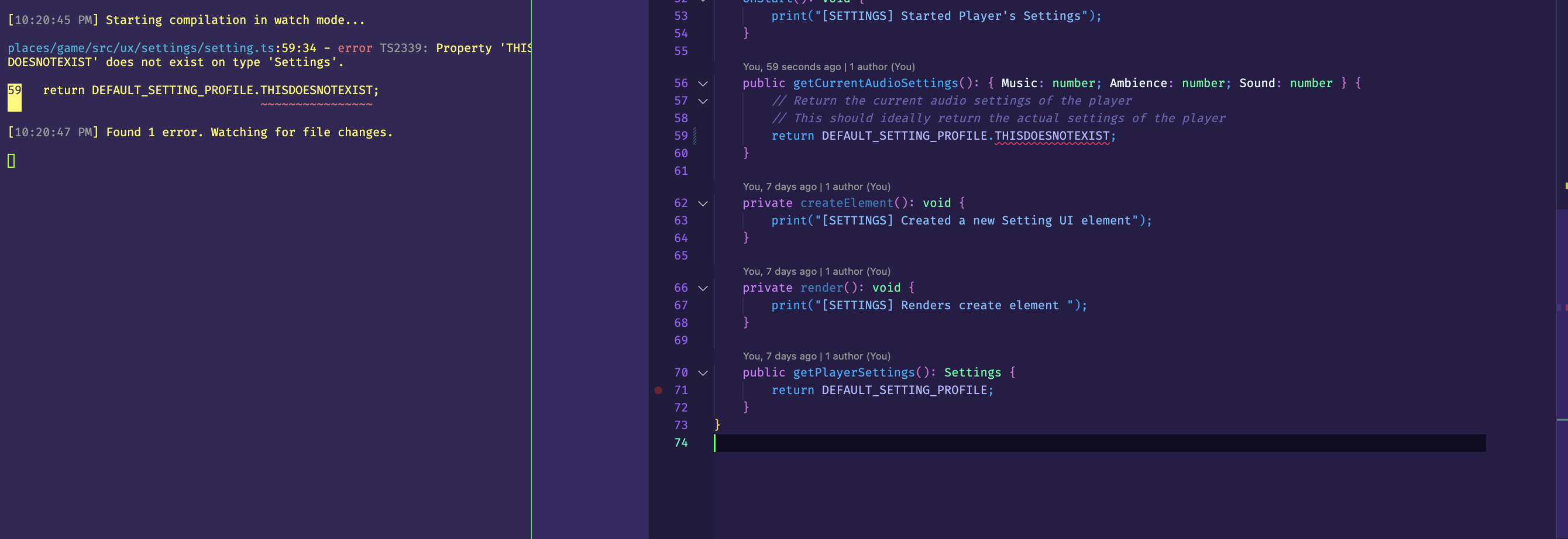It Depends
17 Jan 2024
Hailing From Industry
Javascript, from what I’ve been cultured, was foreseen to be the programming language of the future. Or that is what my mentors claimed back then. I’m not new when it comes to Javascript. My first exposure to this programming language was 8 years ago! Looking back at my GitHub account, my first commit was a DistanceFormula algorithm, written in Javascript back in 2016. It generated random plot points (x1, y1) and (x2, y2) which then computes the distance between such points.
var Plot = [];
var Dis;
function PlotGenerator(min, max) {
for (i=0; i<4; i++) {
Plot.push(Math.floor(Math.random() * max) + min);
}
}
PlotGenerator(1, 10);
//x1, y1, x2, y2
//0, 1, 2, 3
function PythaGorTheroem() {
var ChangeX = Math.pow(Plot[2] - Plot[0], 2);
var ChangeY = Math.pow(Plot[3] - Plot[1], 2);
Dis = Math.round(Math.sqrt(ChangeX + ChangeY));
console.log("nonrounded : " + Math.sqrt(ChangeX + ChangeY));
}
PythaGorTheroem();
console.log(Plot + " --> distance between two plots is : " + Dis);
I was quite a geeky kid back then, so computers were my niche in high school, on, say, the jocks and sports, or nerds and maths. I was obsessed with computers, then led astray to the whole culture of computer sciences, algorithms, programming, and of course - Startups and Silicon Valley when I was young.
Now, hailing from the CS industry, my mental models reign down to adapting to the newest and brightest frameworks of 2024 and beyond. So, learning pure Javascript is quite nostalgic for me, going from the very basics of declaring variables, initializing function signatures, and how implementing common programming constructs like sequences, selections, and loops. Although I’ve been exposed to these concepts a long time ago, I enjoy re-learning the nuances of Javascript, or any programming languages. It shows you how the authors of such languages envision how programs should be designed and constructed, and of course - going from the very archaic languages like LISP, FORTRAN, BASIC, etc., and how such authors designed their language based on their problems during their times. This usually entails techniques or practices that are long-dead or declared bad practices in modern times. This also entails Javascript. A language that was once claimed to be the programming language of the future.
My Thoughts On Javascript
Typescript > Javascript
Now, I’ve been exposed to industry CS, and I would say that most software engineers, when building complex and large-scale software with hundreds to thousands of engineers like you and me, would often pick a programming language that is naturally aligned with the task at hand. Since most of the modern web systems are inherently complex, this calls for a revamp of JavaScript, which evolved to be Typescript, a superset of JavaScript, that is run through a source-to-source compiler. It was meant to be a solution that Javascript lacked, and a pain point that all engineers faced when building industry-level codebase. Now, does that imply that all web-related software systems should be written in Typescript?
It Depends.
Typescript, from what my mentors taught me, enables a developer’s productivity to blossom as the software system grows larger and larger. Now, going from Javascript to Typescript is a strong entry barrier, and from my personal experience, I would get a headache attempting to get the code to work, due to its strong emphasis on its typing rules. The strong learning curve is the cost of building a scalable and maintainable software system down the line. Though that is not to say that one must adopt Typescript for every Javascript project, do in-depth research on the nature of the project itself, and if Typescript can be much a better solution than Javascript, and usually the characteristics of the industry align with the characteristics of Typescript. I would often use Javascript for writing quick and fast hacky scripts.
Even with ES6, the lack of static typing is not ideal in the industry. Stability is one of the characteristics that software engineers should strive for when building large-scale applications, and dynamic typing is not ideal for such a vision. When re-learning JavaScript, I cringed at the idea of not declaring types to my variables, function signatures, and return values. From my experiences, I can see how the accumulation of such code, even though valid, leads to inaccuracies and security vulnerabilities in a large codebase.
Say, for example, implementing a simple multiplication algorithm. Both are valid codes and execute properly, but one is more error-prone than the other.
Written in JavaScript
function multiply(a, b) {
return a * b;
}
console.log(multiply(1, [])) // This will output '0'! A very strange, yet valid behavior in Javascript
Written in Typescript
function multiply(a: number, b: number): number {
return a * b;
}
console.log(multiply(1, [])) // This will, in real time, tell you that your parameters are wrong. [] in not a number.
Simple as these concrete examples are, when you design a large scale codebase with thousands of functions interacting with each other, you’re gonna pray that every function that you or others have written is behaving as expected, otherwise one small input data can crash the entire system, and you will have a messy day of debugging that single problem and getting the system up and running, that could otherwise, been prevented by enforcing a type system.
Another thing I love about Typescript, or say, what I dislike about Javascript, is its error feedback system. Naturally, your Javascript code is determined at runtime, that is, you wait and see if there exists an error whilst the system is actively running. This is not necessarily quite an ideal design to have if your software is running to hundreds or millions of users. You want to productive as possible while shipping concrete good. One of my key characteristics when programming is to have a system in place where it provides real-time error feedback on the code you’re writing. I love it when my compiler is engaging with my code in real-time, even more so, with a lint system in place when writing and correcting code in real-time. Vanilla Javascript doesn’t tap into my programming flow and usually creates more pain than fun when coding. For example, here is a feedback system layout in my personal code editor

As you can see, in my Typescript setup, the transpiler can do type-checking on the fly while coding in real-time. It does this every time you write code in real-time, while, in Javascript, you must pray and hope that this function works every time you manually run your code. I’m certain that somewhere in the Human-Computer Interface aspects of programming, this fast feedback system is ideal for developer productivity.
Atheltic Software Engineering ~= LeetCoding Culture
Is this good attribute for a competent software engineer?
In academia, I’ve been encultured by an interesting niche activity that most software engineers have been confronted with in their professional lives, which in this context, our instructors call such activity - ‘Athletic Software Engineering’. I’ve written various blogs about such culture, including its strengths and flaws when hiring a competent software engineer for any type of tech job, as well as my experiences when navigating an internship position in Big Tech. The key premise is that, given a small finite amount of time, generally, fifteen to thirty minutes, you are confronted with an algorithm problem, to such you must provide a solution, generally expected an optimal, optimized implementation of your solution written in your favorite language. Do these enough times successfully in a tech interview, you’re hired. Fail to solve a single problem, you’re out of the equation. Now, is such activity a key signal to hiring a competent software engineer?
It Depends.
Apart from this Athletic Software Engineering, is the key routine of W.O.Ds. (Workout of The Day), which are short bursts of algorithm questions that we solve promptly. I find any nature of such activities to be a good practice supplement to landing a job in Big Tech. Hence, this style of learning attempts to simulate such a process is good exposure to handle a variety of feelings you’ve often faced in the real event. Because we are faced with hard algorithm problems, high expectations, and a short finite amount of time for completion, such activity is inherently stressful. Sometimes I wonder if this core activity correlates to being a competent software engineer, but all I do know is that we are thrust into this process that could determine whether we are broke or financially stable. I think most software engineers generally do not like this type of activity, but is a requirement for breaking entry to a new tech job, that all techies must do, from a new grad role to a senior engineer. I suppose a good way of thinking about this is that it’s the bitter pill we must swallow to be successful, as in, landing an offer, in any technical industry that follows the leetcoding culture.
I used to be a competitive programmer in my freshmen year of University, representing in the 2019 ICPC, a known competitive programming competition, so I do find such nature of activities enjoyable if and only if there are no high expectations of making it run successfully. We do it for fun. Algorithms, in general, is still a very interesting field to me, and it’s akin to how mathematicians are obsessed with solving toy problems in their field of work, or say a physicist modeling and solving toy problems in their free time. Of course, abstracting all the hardware and fancy software frameworks, it all boils down to algorithms and data structures, which I believe, is a key mental model that all software engineers should encode in their head.